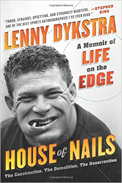
 |
House of Nails: A Memoir of Life on the Edge
by Lenny Dykstra
William Morrow
With the tenacity of Ty Cobb and the bodacious behavior of Babe Ruth, professional baseball player Lenny Dykstra embraced life both on and off the diamond. At only 160 lbs, he was a relatively under-sized athlete, but being acutely aware of his goals and possessing razor-sharp timing, he broke into the major leagues in the mid-1980s and cut a path toward becoming a dominant player.
Much of his life has unfolded in this fashion. On the field, he hit, caught, and ran with the best. He crashed into walls and tossed his body and fists with reckless abandon. Off the field, he put in the work and took the drugs he needed to maintain the grueling six-month schedule that drives pros to early retirement. Nothing seemed to exhaust his enthusiasm for baseball and all the fringe benefits—cars, parties, women. For twelve years, he was the guy you wanted on your team, and his contribution to two World Series is undeniable. However, this only scratches the surface of his candid memoir, which could easily be transposed in action and attitude to that of a Wild West cowboy drama.
After his baseball days, the Dykstra cattle drive continued. He demonstrated a nose for success that parlayed into a string of luxury car washes and a talent for picking stocks on the options market. He never goes small or halfway. Possessing more energy and grit than the average man, he made plans and then made them bigger. There's duality of sincerity and relentlessness that weaves through his life. He was a married man with a family, but his lifestyle involved enough Gulfstream jet travel, women, and substance-driven enhancements to fill a California mansion. Oh yes, he owned a couple of those as well.
Because he had no concern with boundaries and his hangers-on and business associates had no interest in leaving any of his money on the table (and none of them did), he bottomed out in rehab and later during two stints in prison after a questionable application of the law. In this modern western, he rolled into the wrong town and got his butt kicked, and he admits that he rushed headlong into all of it. Broke and divorced, he fell from heights that many of us admire to the pits that all of us fear. Again, Dykstra doesn’t do life halfway.
The beauty of this memoir is in its honest delivery, which forms its own kind of ethical code alternating between its depiction of excellence, indulgence, and disturbing realism. You want to hug Dykstra and smack him at the same time, if you dare because both clearly have their costs. He scales every mountain unafraid and is successful against the odds, and he pays all the tolls on the way down. However, you gather the sense that down is just another place he finds himself and not his state of mind. If there’s a photograph of him not smiling, it'd be difficult to find.
Dykstra's detractors employ all forms of condescension to debase him, but they rank among the naive who understand themselves perhaps even less than the human condition. As the elites conjure countless tsunamis to destroy the middle class, likely because they have contempt for that everyday blue collar man, Dysktra stands up for the American Dream in a defiant and admittedly sometimes perverse way. It’s a truthful story without the moralist veils that keep many memoirs stuck in second gear. So, he’s got the nerve to keep it real, too.
RECOMMENDED by the US Review
Next Focus Review
Previous Focus Review